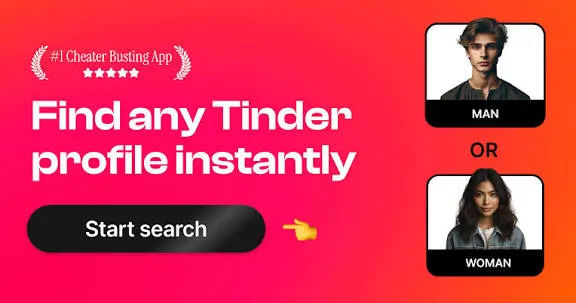When I first came across CheatEye AI, it sounded like a futuristic solution to a timeless problem: finding out whether someone is secretly active on Tinder. Out of curiosity (and skepticism), I tested it myself. What started as a quick check turned into a week-long investigation. I compared claims, checked reviews, tested multiple searches, and dug into its privacy and payment structure. What follows in this article is a genuine, human-level review not sponsored fluff or recycled copy. It’s about what actually happens when you use CheatEye AI and whether it deserves your trust.
What Is CheatEye AI And How It Works?
CheatEye AI presents itself as a Tinder activity detector, powered by AI. Its job is simple in theory: enter a name, city, or photo, and it scans Tinder’s public-facing data for any potential matches.
I walked through the process step by step:
- Opened the official CheatEye AI site.
- Enter the person’s name and approximate location.
- Uploaded a clear recent photo for better matching.
- Hit “Start Search.”

- Waited around two to three minutes while it processed.
- Received a blurred preview of possible matches.
- Was prompted to pay to unlock full results.
The tool claims it doesn’t need your Tinder login and that your searches remain anonymous. However, from my testing, the matching results are inconsistent. Sometimes it gets close; other times it completely misses. The free part mostly shows blurred teasers, hinting at accuracy but holding details behind a paywall.
Is It Truly Free Or Just “Freemium”?
The term free is used loosely across the CheatEye AI site. While you can technically initiate a search without paying, getting the actual results requires payment.
Here’s how that plays out in reality:
- The “free search” only gives you a glimpse, partial or blurred photos.
- To unlock names, bios, or activity timestamps, you must buy access.
- Some users report unexpected recurring charges tied to its “Radar” subscription model.
- Refunds are difficult to get unless the company confirms a technical fault.
- Support responses tend to be generic and slow.
The marketing implies it’s a no-cost solution, but in truth, it’s a freemium trap, free to tempt you, paid to deliver anything meaningful. Many reviewers on Trustpilot echo this sentiment, calling the platform misleading or paywall-heavy. Based on my use, it’s not a scam, but it’s definitely not free in any practical sense.
Legitimacy And Trust Factors:
To understand whether CheatEye AI is legitimate, I analyzed both its technical setup and legal grey zones.
Technical Factors
- The website uses HTTPS, ensuring encrypted data transfer.
- Scamadviser rates it as moderately trustworthy (around 70%).
- The domain registration is hidden via privacy protection.
- No verified company address or owner details are disclosed.
- Mixed reviews: some users report genuine hits; others find only fakes.
Legal & Ethical Factors
- The tool claims to use “public Tinder data,” but Tinder’s terms forbid third-party scraping.
- Depending on your country, such searches could violate privacy laws (e.g., GDPR).
- Because data comes from partially scraped sources, accuracy isn’t guaranteed.
In short, CheatEye AI isn’t an outright scam, it works on a technical level, but it’s not fully transparent or risk-free. Users should approach it like an unofficial investigative tool, not a certified verification service
Accuracy And Limitations of CheatEye AI:
The site’s promises sound bold, but real-world accuracy varies wildly.
Key observations from my own testing and other users’ reviews:
- Best results occur when the person’s name and city are unique.
- False positives happen with common names or similar photos.
- Deleted or private Tinder accounts rarely show up.
- Outdated results may appear even after someone deactivates their profile.
- Teaser previews often exaggerate match certainty to encourage payments.
One search returned a believable match that turned out to be unrelated when cross-checked. Another, for a real Tinder user, yielded nothing. It proves that CheatEye AI can suggest, not confirm,.treat it as a clue, not evidence.
Data Privacy Concerns:
Before you even begin using CheatEye AI, you’re required to enter sensitive information, someone’s name, city, and sometimes even a photo. That immediately raises a privacy red flag. While the platform claims it doesn’t store or misuse data, there’s no public privacy audit or third-party certification backing those claims.

A closer look reveals:
- The site’s privacy policy is vague and lacks clear data retention timelines.
- It doesn’t explicitly mention encryption of uploaded photos beyond transit.
- No clear contact information for data deletion requests.
- Hidden domain ownership makes accountability hard to trace.
- Uploading personal data of others without consent could violate privacy laws.
- Once you submit, you lose control, the image may remain on third-party servers.
If you’re sensitive about digital footprints (and you should be), it’s best to proceed cautiously. The platform gives no concrete proof that your submissions are deleted after use.
User Reviews And Community Feedback:
I didn’t rely only on my experience, I scanned dozens of Trustpilot, Reddit, and Quora threads about CheatEye AI. What I found paints a mixed but telling picture.
- Positive feedback: A few users reported legitimate results. They managed to find partners’ dating profiles that matched perfectly with real photos or bios.
- Neutral feedback: Some said it gave “possible leads” but lacked confirmation. They viewed it as an investigative tool rather than proof.
- Negative feedback: Many accused the platform of misleading advertising, citing constant paywalls, failed searches, or unwanted subscriptions.
The verdict? CheatEye AI has genuine users, but far from universal satisfaction. The reviews echo one theme: expect curiosity-satisfying snippets, not courtroom-level evidence.
Payment Model And Hidden Charges:
The payment model is where CheatEye AI gets tricky. The platform markets “free” access, but most users encounter a subscription trap after their first purchase.
Steps of how it unfolds:
- You conduct a “free” search and see blurred results.
- You pay for a one-time unlock to view details.
- You’re unknowingly enrolled in an auto-renewing plan (“Radar” or “Ongoing Monitoring”).
- The next billing cycle charges your card automatically.
- Cancellation requires manual email contact, no instant cancel button.
- Refunds are inconsistent and depend on “proof of non-functionality.”
So while CheatEye AI isn’t outright fraudulent, its billing model feels manipulative. Always double-check small print and unsubscribe immediately after your first test if you don’t plan to continue.
Comparison With Similar Tools:
It’s not alone in this niche, several other tools try to offer similar Tinder-detection services. Here’s how CheatEye AI compares:
| Platform | Claims | Free Tier | Accuracy (User Feedback) | Transparency |
| CheatEye AI | AI-powered Tinder scanner | Partial preview only | Moderate | Hidden ownership |
| Social Catfish | Reverse image & username lookup | Limited search | High | Verified company |
| TruthFinder | Background and dating profile reports | Paid-only | Reliable for U.S. data | Transparent |
| Spokeo | General people search | Minimal preview | Medium | Publicly traded |
CheatEye’s appeal lies in its Tinder-specific promise. But compared to long-standing tools like TruthFinder, it’s newer, less proven, and less transparent.
Who Should And Shouldn’t Use It?
CheatEye AI may seem tempting, but it’s not for everyone. Based on my testing, here’s a fair breakdown:
You can try it if:
- You’re curious and don’t mind paying a few dollars for experimentation.
- You understand that the data may be inaccurate or outdated.
- You need a quick cross-check but not official confirmation.
Avoid it if:
- You’re looking for foolproof evidence of cheating.
- You’re not comfortable sharing others’ personal data online.
- You dislike automatic renewals or hidden billing.
In essence, CheatEye AI is for casual curiosity, not for trust issues that require real verification.
Ethical And Emotional Boundaries:
Using AI tools like CheatEye touches a deeper layer, ethics and emotion. When you type someone’s name into such platforms, you’re not just searching for data; you’re crossing into their private digital life.
CheatEye AI exists in a moral gray area. It doesn’t hack accounts, but it indirectly encourages surveillance. The emotional toll of finding (or misinterpreting) results can be serious broken trust, paranoia, or unnecessary conflict.
Before using it, ask yourself: Is it worth knowing? Sometimes, honest conversations bring more peace than AI-driven searches.
Safer Alternatives of CheaterEye AI:
If your intention is to verify online activity without invading privacy, consider these safer alternatives:
- Open social media checks – Look for public posts or mutual connections.
- Direct communication – Discuss concerns openly with your partner.
- Professional investigation – Hire licensed digital investigators if serious.
- Public data search tools – Use reputable databases like BeenVerified or TruthFinder.
- Relationship counseling – Sometimes mistrust stems from miscommunication, not betrayal.
CheatEye AI may satisfy curiosity, but safer methods protect both sides from digital and emotional harm.
My Experience Verdict :
After spending hours testing, reading policies, and comparing reviews, here’s my genuine conclusion:
CheatEye AI is partly functional but not fully trustworthy. It’s not a scam, results appear real sometimes, yet it operates with vague policies, partial transparency, and exaggerated marketing. Think of it as a semi-useful AI search toy, not a serious investigation tool.
For casual curiosity, it’s fine. For relationship proof, it’s unreliable. For privacy-conscious users, it’s risky. Use it once, learn your lesson, and move on.
Conclusion:
CheatEye AI sits somewhere between convenience and controversy. It works, but imperfectly. It attracts attention with its promise of AI-powered truth but hides its complexity behind paywalls and vague assurances. The real lesson? Technology can’t replace communication. If suspicion drives you to such tools, the issue may need dialogue, not data.
In short: CheatEye AI is semi-legit, not free, and definitely not foolproof.
FAQs:
No. You can start a search for free, but full results require payment or subscription.
It uses HTTPS encryption but lacks verified data handling policies. Use with caution.
Only partially. Results are based on limited Tinder data and may show false positives.
You need to email their support directly, there’s no instant cancellation option on the site.
TruthFinder, Social Catfish, or open social media searches are safer and more transparent options.
